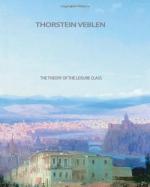
|
| Name: _________________________ | Period: ___________________ |
This test consists of 5 multiple choice questions, 5 short answer questions, and 10 short essay questions.
Multiple Choice Questions
1. What does Veblen see as evidence of the martial spirit in the leisure class?
(a) Lawsuits.
(b) Dueling.
(c) Competitive business practices.
(d) Monopolies.
2. Under what heading does Veblen put sports and fighting and other manifestations of the predatory temperament?
(a) Savagery.
(b) Disgruntlement.
(c) Exploitation.
(d) Unproductive aggression.
3. How does Veblen describe the industrial classes' relationship with sports?
(a) As a passion.
(b) As an occasional diversion.
(c) As an addiction.
(d) As a form of warfare.
4. To what does Veblen say that education is similar?
(a) Mercantilism.
(b) Devotional practice.
(c) Warfare.
(d) Marriage.
5. What is education's relationship with the supernatural, according to Veblen?
(a) Education proves the correctness of church doctrine.
(b) Education allows people to live by reason instead of superstition.
(c) Education gives people knowledge for their devout observances.
(d) Education provides the agents of growth and individual development that prove the doctrine of divine grace.
Short Answer Questions
1. To what agency does Veblen attribute industrial man's faith in luck?
2. What does Veblen say fighting does for lower-class delinquents?
3. Who benefits by a scholar's work?
4. To what does Veblen compare the martial spirit in lower-class delinquents?
5. How does Veblen say the clothing of worshipers differs from daily clothing?
Short Essay Questions
1. How do the leisure classes change over time?
2. What traits in men are required for the success of a community, in Veblen's description?
3. What are the effects of devout observances?
4. How do institutions change?
5. How do the devout observances of the clergy have their cultural-economic effect?
6. What are the ethnic types Veblen defines, and how does he describe them?
7. How is education similar to the observance of devotional functions and magic?
8. How does Veblen describe the situation of modern women, the women of his time?
9. What is martial spirit, and which classes demonstrate it?
10. How does the study of the classics and classical languages change over time?
|
This section contains 811 words (approx. 3 pages at 300 words per page) |

|




